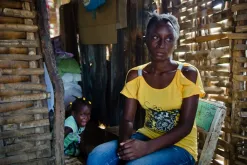J’aimerais que leurs histoires et leurs visages soit connus des autres également : faire le portrait de ces mères adolescentes dans leur environnement de vie et de travail, de collecter leurs témoignages et de donner à voir les conséquences des grossesses précoces.
Miragoâne, Haïti: «Quand pourras-tu voir ton fils ?» lui ai-je demandé. «Dans moins de deux semaines, pour deux jours.» Un faible sourire s’inscrit sur le visage fatigué de Michonda. «Cela fait quatre mois», ajoute-t-elle.
Il y a cinq ans, alors qu’elle avait à peine 13 ans, l’enfance de Michonda lui a été volée. Elle a été victime d’un viol et est tombée enceinte. Alors que son agresseur a pu échapper à la justice, Michonda a dû faire face à ses nouvelles responsabilités. Obligée d’abandonner l’école, elle a dû chercher un travail pour pouvoir subvenir aux besoins de son enfant.
Cela fait quatre ans qu’elle est arrivée à Miragoâne, à 25 km de sa ville natale de Petit-Goâve, en laissant son petit garçon derrière elle aux soins de sa mère. Michonda travaille comme domestique ; ses journées commencent à 4 heures du matin et se terminent vers 11 heures du soir, sept jours par semaine, pour moins de 40 dollars US par mois.
Si on lui demande à quoi elle rêve, elle répond deux choses : elle aimerait avoir son fils auprès d’elle, et pouvoir un jour retourner à l’école. Elle ne peut se permettre ni l’un ni l’autre.
Malheureusement, chaque année ce sont plusieurs milliers de jeunes haïtiennes qui sont affectée par cette même tragédie : en Haïti, 29% des femmes de moins de 19 ans ont déjà un enfant ou sont enceintes. La plupart de ces grossesses sont le résultat de viols ou d’autres types de violences sexuelles, y compris la prostitution de survie. Les conséquences sont extrêmement graves : abandon de l’école, problèmes psychologiques, rejet par la famille ou la société, mariage forcé, violences conjugales, accroissement de la précarité et renvoi des enfants comme « restavecs » (une forme moderne d’esclavage). L’impact sur le bien-être et le fonctionnement de la société dans son ensemble est également considérable.
Il y a quelques temps j’ai commencé à rencontrer des femmes, des jeunes filles et des femmes plus âgées qui sont devenues mères bien trop jeunes. Je voulais écouter l’histoire de leurs vies et les regarder dans les yeux, ce qui bien souvent en dit plus que les mots.
Ces femmes sont l’une des raisons pour lesquelles je suis venue en Haïti et j’ai rejoint la mission. Prendre en compte les combats quotidiens des Haïtiens est fondamental et une part importante de ma motivation pour mon travail.
J’aimerais que leurs histoires et leurs visages soit connus des autres également, c’est pourquoi j’ai initié le projet « My dream » (Mon rêve). L’objectif est de faire le portrait de ces mères adolescentes dans leur environnement de vie et de travail, de collecter leurs témoignages et de donner à voir les conséquences des grossesses précoces.
Je demande aussi aux femmes quels sont leurs rêves. Ils sont généralement très «ordinaires» : reprendre l’école, avoir sa famille près de soi, trouver un emploi, assurer un avenir meilleur à leurs enfants, ne plus être victime de violences, être heureuse….
Je suis convaincue que nous devons, et pouvons, tout mettre en œuvre pour que ces rêves «ordinaires» deviennent réalité.
A propos : Agnieszka Napierala est en poste à Miragoâne (Haiti) depuis juin 2012 en tant que Volontaire des Nations Unies en charge de la coordination des élections. Elle est diplômée de l’Université d’économie de Poznan et de l’Institut d’Etudes Politiques de Paris. Elle a travaillé dans le marketing pendant quelques années, puis dans la gestion de programme de développement avec la Commission européenne. Jusqu’en juin 2012 elle travaillait comme Volontaire de l’ONU – Conseillère pour les élections auprès de l’opération de maintien de la paix en Côte d’Ivoire (ONUCI). En tant qu’activiste des droits de l’homme de longue date, elle cherche toujours à intégrer la société civile, à la soutenir et à partager ses expériences, et elle s’intéresse également à la photographie sociale.

